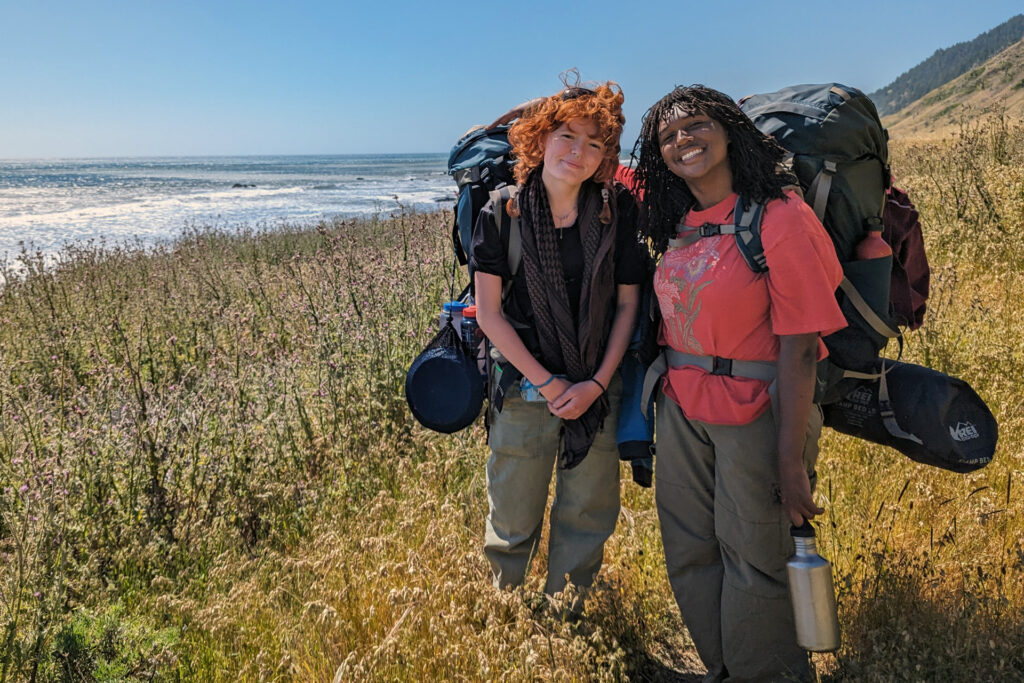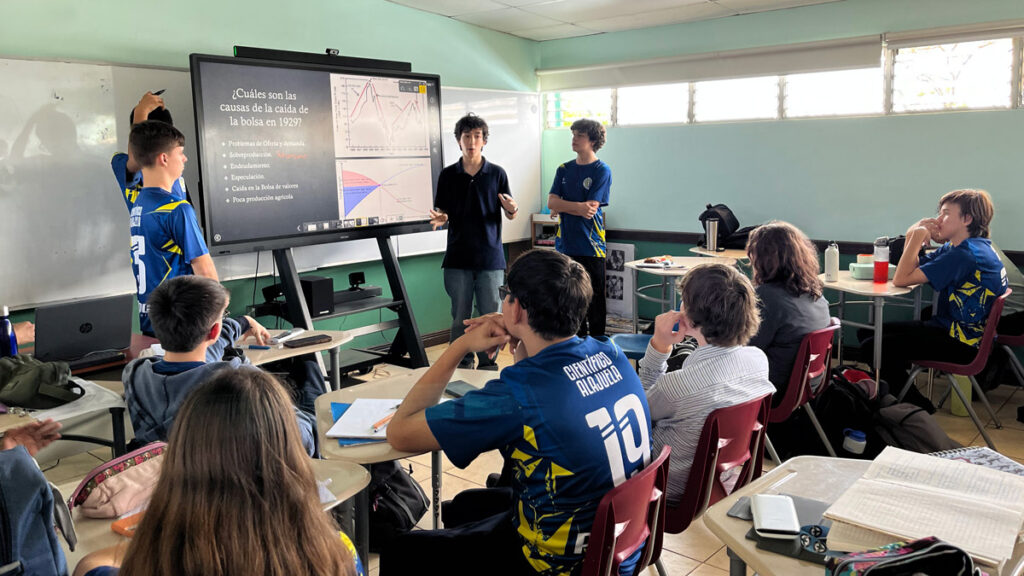
Field Studies Curriculum
Where you fall in love with what you learned in the classroom.
In the Field Studies program, learning takes place through immersive, hands-on experiences that apply classroom knowledge to the real world. Students solve problems, make decisions, and reflect on their actions as they navigate a variety of environments. Whether exploring ecological systems, addressing complex social issues, or building technical outdoor skills, the program emphasizes learning by doing.
Our curriculum is designed around our eight values and goals. Explore more about them below.
Program Values and Goals
Outdoor Competency
A strong foundation of technical outdoor skills allows students to flourish in challenging and remote environments. As students develop these skills, they are able to take ownership of different aspects of each trip and transfer them to their own lives.
Self-Reliance
A practice of self-care and interdependence fosters confidence and provides the tools to keep ourselves healthy. Students expand their support networks, develop a stronger sense of self efficacy, and practice taking ownership for their actions.
Self-Resilience
Self-management and problem-solving skills are essential for navigating challenges, adapting to new situations, and engaging with vulnerability. These skills empower students to trust their own decision-making while recognizing when to seek help.
Self-Reflection
Active participation, combined with dedicated reflection, creates a powerful framework for personal growth and self-expression. Students explore their core values and thoughtfully share their stories, fostering deeper self-awareness and connection with others. Through this process, students cultivate gratitude, self love, and positive self-identity.
Relationship Skills
Effective communication helps students build and maintain healthy relationships, listen actively, and support one another socially. Students consider how to advocate for themselves and others, set boundaries, and approach conflict with empathy and responsibility. This practice helps students cultivate deeper interpersonal awareness, while fostering a culture of respect and mutual support.
Teamwork
High-performing teams continually strive towards excellence, supporting one another to reach their full potential. Students build collaboration skills by taking on team roles, offering feedback, and celebrating each other’s diverse strengths. Effective teamwork fosters trust, accountability, and creativity.
Sense of Place
Students deepen their understanding of the natural world by engaging in wonder and inquiry. They explore essential questions, including:
- Where am I? understanding what makes this place special
- Why are we here? applying what we’ve learned in the classroom
- What is here? observing and appreciating the elements of nature
- Who is/was here? learning about the people that have shaped this place
Impacts and Issues
Real world applications of classroom learning allow students to explore timely environmental and social justice issues, both locally and globally. Students reflect on their values, consider differing perspectives, and take action as stewards and agents of change in their communities and beyond.

Summer Field Studies Offerings
Field Studies don’t stop when the school year ends. Whether you’re a member of the Sequoyah community or not, we’re happy to share our summer adventures with you!
Curriculum Case Studies
Anza Borrego (Kindergarten-Second Grade)

Our youngest students go camping for two nights in Anza Borrego State Park. Each student brings one parent along, and they spend all year in class learning about, building skills, and preparing for the trip. Then the students become the experts, teaching their parents about the desert while experiencing the magic of the palm oasis and swaying creosote themselves.
On the trip, students dive in hands-first, asking essential questions, drawing, noticing, and collecting data. Through wondering about and wandering through their surroundings, students engage more deeply with their learnings, cementing classroom concepts by seeing their applicability in the real-world.
Essential Questions
- What makes the desert special?
- How does sunlight affect temperature in the desert?
- What adaptations help animals, plants and insects thrive in the desert habitat?
- How can I find information about the desert?
Limuw (Fourth-Fifth Grade)

Each October, the fourth and fifth-graders embark on a four-day adventure to Limuw (Santa Cruz Island), part of Channel Islands National Park. This unique setting offers students the chance to practice backcountry skills while exploring the island’s diverse flora, fauna, and geology. Students kayak through sea caves, snorkel in kelp forests, and hike to remote corners of the island. Throughout this trip, they also practice integrating classroom knowledge through dedicated nature journaling and wildlife observation.
This trip offers hands-on learning and a deeper connection to the natural world, all while developing essential outdoor competencies in a stunning, remote environment. Throughout this journey, students will strengthen key skills outlined in our curriculum map. As this is the first backpacking experience for many students, we focus on developing Outdoor Competency. Students will learn to use backpacking gear they may be unfamiliar with, and they will work together to cook meals for the large group on backpacking stoves.
As they engage with the island’s unique ecosystem, students will experience a deepened Sense of Place, reflecting on what makes this environment special, the people who have lived here in the past, and the importance of preserving it. This will tie into discussions about Impacts and Issues, where students will consider the environmental challenges facing our planet, particularly the impacts of waste and pollution on marine ecosystems. Their shared experiences on the island will also strengthen Teamwork and Relationship Skills, as students work together, communicate effectively, and support one another in this new setting.
Essential Questions
- How do I keep myself safe in the kitchen and how do I cook food for others?
- What are the unique factors of the channel islands ecosystems?
- How can I be an environmental steward for marine ecosystems?
- How can I support my team while also mentoring others?
Klamath (Junior High)

The 257-mile length of the Klamath River provides a unique abundance of topics to explore, such as geology of volcanoes, redwood ecology, Modoc and Yurok history, and a salmon’s life cycle. Prior to the trip, students form small groups to identify and research a topic which they then present about on the trip.
Giving lessons in locations pertinent to the topic offers profound opportunities to see their interests manifest in real-life situations. Sequoyah students have gone on this trip since 2018 and witnessed the environment change in real time, as differing snowpacks impact the shallow lakes and as the dam removal project progresses.
They practice their Self-Resilience through potentially challenging weather conditions, Teamwork as they manage multiple transitions between camps, and Self-Reflection as many of them prepare to transition into high school.
Essential Questions
- How should public lands be used and who should they serve?
- In what ways are ecosystems tied closely together, despite being hundreds of miles apart?
- What can we learn about past decisions and the impacts they caused?
- How do I see the needs of the group and take action?
Costa Rica (10th Grade)

Every spring, 10th-grade students embark on an exciting 10-day trip to Costa Rica, organized in collaboration with the Social Innovation Program. This trip is a unique opportunity for students to explore how their changemaking skills and values can be applied in a new cultural and geographical context beyond the classroom.
The majority of the trip is spent living with families in the rural community of Cedral, where students immerse themselves by hiking, participating in a service project, playing soccer, cooking together, and learning about contemporary social and political issues. Along the way, they engage in meaningful conversations and hands-on experiences that deepen their understanding of social innovation. The trip also includes time in Alajuela to explore Costa Rican culture and prepare for their return to the U.S.
The experience will encourage deep Self-Reflection, allowing students to explore their values, share personal stories, and strengthen their sense of identity. They’ll grow their Relationship Skills through active listening and conflict resolution as they navigate cultural differences with their homestays and the host community. As they explore Costa Rica’s rich culture and environment, students will develop a deeper Sense of Place, engaging with the land, its history, and the people who shape it. Ultimately, they will connect these experiences to global Impacts and Issues, considering their role as changemakers and environmental stewards in both local and global contexts.
Essential questions
- How can I develop a commitment to practicing cultural humility while traveling?
- How can I apply Spanish language skills in my home stay?
- What is my responsibility as a changemaker to my own community? To global communities?
- What intersections exist between service learning and ethical community development?
Hastings Natural History Reserve (11th Grade)

A small group of 11th graders form the Social Innovation Program Human Ecology Fellowship each year. For six months leading up to the Hastings trip this group undergoes a blend of academic study, fieldwork, planning, and investigation of their personal values as they relate to sustainability, health, justice, and responsibility. This group also reaches out to area partners to provide rich learning experiences during the trip.